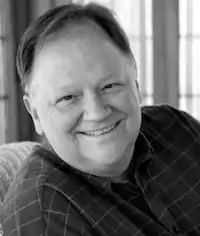Mel Duncan
Melvin Earl Duncan (born May 22, 1950 in Davenport, Iowa) is the founding Executive Director of Nonviolent Peaceforce (NP), a civilian peacekeeping organization based in Geneva, Switzerland. He holds a bachelor's degree in Political Science from Macalester College in St. Paul, Minnesota and a Master of Arts in Humanities and Leadership from New College of California.[1]

Biography
In 1979, Duncan helped organize Advocating Change Together (ACT), the first self-advocacy group in the U.S. for people with developmental disabilities and subsequently served as executive director of the Minnesota Jobs with Peace Campaign and the Minnesota Alliance for Progressive Action. His volunteer activities have included service as a peacekeeper on the border of Nicaragua during the Contra war, delivering medical supplies to Iraq, and working for the election of US Senator Paul Wellstone in 1990.[2]
Duncan met peace advocate David Hartsough at the Hague Appeal for Peace in May 1999. The two began laying the groundwork for an international non-governmental organization to put nonviolent strategies into practice for the prevention and mitigation of violence in conflict zones. Based on Mohandas Gandhi's concept of a Shanti Sena or "peace army," the model involves the use of trained, unarmed civilian peacekeepers working with local groups to create space for nonviolent conflict resolution.[3]
Nonviolent Peaceforce was inaugurated in 2002 with Duncan as Executive Director and has since conducted civilian peacekeeping operations in Sri Lanka, the Philippines, Guatemala and Sudan.[4] In 2007, NP was granted Special Consultative Status to the Economic and Social Council of the United Nations.[5]
Awards
Duncan's awards and honors include the 2006 Distinguished Citizen Award from Macalester College[6] and the 2007 International Pfeffer Peace Award from the Fellowship of Reconciliation.[7] In 2008 he was named one of "50 Visionaries who are Changing Your World" by Utne Reader.[8]
See also
References
- Nonviolent Peaceforce Executive Director profile
- Nonviolent Peaceforce Executive Director profile
- Nonviolent Peaceforce FAQ
- "Untold Stories: Nonviolent Peaceforce and the Work of Reconciliation," Pulitzer Center. "Untold Stories: Nonviolent Peaceforce and the work of reconciliation". Archived from the original on 2009-09-08. Retrieved 2009-12-02.
- ECOSOC Civil Society Network
- Alumni Awards, Macalester College website Archived 2008-12-08 at the Wayback Machine
- "FOR to Hold Third Annual Festival of Peace in Nyack". Fellowship of Reconciliation. Archived from the original on 19 November 2015. Retrieved 18 November 2015.
- Utne Reader. 13 Nov 2008